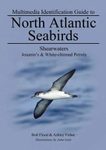Monograph
New
By: Rob Thomas(Author)
335 pages, 150 colour photos, b/w illustrations, colour tables
The definitive work on the European Storm-petrel and its relatives, by one of the world's leading experts on the species.
![The Storm-Petrels The Storm-Petrels]()
Click to have a closer look
About this book
Contents
Customer reviews
Biography
Related titles
About this book
Imagine a bird as small as a sparrow, which lives most of its life on the open ocean yet can survive for decades. It walks on the water, and migrates halfway around the world, returning to remote islands to breed underground, often in exactly the same rock crevice each year. To attract a mate it sings like a fairy and smells aromatic, but it vomits oil onto its enemies. It visits its nest by night, lays a single enormous egg, and feeds its chick until the nestling weighs more than its parents put together. It seems to have little fear of humans but was itself sometimes feared by ancient seafarers.
This might sound like the stuff of legend, but is actually the description of a real creature: the European Storm-petrel; walker on water, global wanderer, climate sentinel and open-ocean survivor, and a member of a group of around twenty species that form the Hydrobatidae family.
This, the latest in the Poyser series, follows the remarkable life of the storm-petrels. Focusing on the European species, it tracks their lives from the remote North Atlantic islands where they breed via the coasts of Africa to the South Atlantic and Indian Ocean where they spend the northern winter, while expanding to discuss the other members of the storm-petrel family. We learn about their evolution, behaviour, ecology, and adaptations to a life in the harsh and unpredictable environment of the open ocean, and discover what these enigmatic seabirds can tell us about what humans are doing to our planet.
Illustrated with 150 photographs, and including the author's personal anecdotes and observations, Storm-Petrels highlights some of the most exciting recent research findings and sets a trajectory for future discoveries.
Contents
Preface
1. Introduction: the European Storm-petrel and its relatives
2. What is a storm-petrel?
3. The challenges of survival at sea
4. Diet and foraging behaviour
5. The storm-petrel's sensory world
6. Tracking the tiniest seabirds
7. Communication and mate choice
8. Breeding biology
9. Predators, parasites and pathogens
10. Conservation of storm-petrels
11. The southern storm-petrels
12. The northern storm-petrels
13. Storm-petrels in human culture
14. Encounters with storm-petrels
Epilogue
Acknowledgements
References
Glossary
Index
Customer Reviews
Biography
Rob Thomas is a Senior Lecturer in Zoology at Cardiff University, where he has been based for more than 20 years. He specialises in bird behaviour and ecology, particularly the behavioural responses of birds to changing environments. Rob has been involved in storm-petrel studies since he was 16, and his research now takes him to islands in Wales, Scotland and the Faroes to study storm-petrel breeding behaviour, and to the coasts of southern Portugal, where he examines their long-distance migration journeys.
Monograph
New
By: Rob Thomas(Author)
335 pages, 150 colour photos, b/w illustrations, colour tables
The definitive work on the European Storm-petrel and its relatives, by one of the world's leading experts on the species.


















































